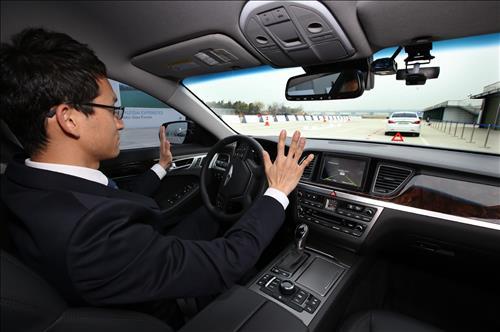Self-driving cars expected to hit local market by 2020
By Korea HeraldPublished : May 6, 2015 - 18:44
Self-driving cars are expected to be commercially available in South Korea by 2020, government officials said Wednesday
The Ministry of Land, Infrastructure and Transport unveiled the plan during a ministerial meeting on regulatory reform.
Under the plan, the government will support commercialization of level 3 vehicle automation technology that will partially enable the vehicles to complete journeys without human intervention.
“The ministry expects that the pan-governmental support will advance the commercialization of self-driving cars and help to lead the future auto market,” said director Meng Sung-kyu of the ministry’s transport and logistics office.
The Ministry of Land, Infrastructure and Transport unveiled the plan during a ministerial meeting on regulatory reform.
Under the plan, the government will support commercialization of level 3 vehicle automation technology that will partially enable the vehicles to complete journeys without human intervention.
“The ministry expects that the pan-governmental support will advance the commercialization of self-driving cars and help to lead the future auto market,” said director Meng Sung-kyu of the ministry’s transport and logistics office.

The measure is designed to stimulate autonomous driving technology development which lags behind other countries and foriegn players in auto trends.
Currently, foreign carmakers are testing vehicles with level 3 automation, in which the driver is expected to be available for occasional control, but with sufficiently comfortable transition time. South Korea’s largest automaker Hyundai Motor plans to produce level 2 automation vehicles by the end of this year.
No country allows official sales or operation of driverless cars but some regions in leading car producing countries, including the United States and Britain, support their test runs.
“By nurturing the convergence of car, information technology and communication, the country will be able to secure global competitiveness,” Meng said.
He also said that the auto steering system will prevent negligence of drivers, resulting in dramatically fewer traffic accidents.
The Transport Ministry estimated that the autonomous cars would save some 500 billion won in traffic accident costs and cut the number of death tolls on highways by 50 percent.
At the meeting, the ministry also said that it will form high-tech logistics complexes, dubbed “e-Logis Town” for decrepit logistics terminal and distribution facilities located around city areas.
The move comes as global companies, such as Amazon and Alibaba, strengthen their competitiveness based on cutting-edge logistics infrastructure amid the rapid growth in e-commerce market.
The ministry said it will utilize the city logistics town as a base to accelerate integration of retail, logistics and ICT industries.
It will select five sites for the pilot project among some 150 logistics-related facilities after consultation with local governments.
By Park Han-na (hnpark@heraldcorp.com)
-
Articles by Korea Herald





![[K-pop’s dilemma] Can K-pop break free from ‘fandom’ model?](http://res.heraldm.com/phpwas/restmb_idxmake.php?idx=644&simg=/content/image/2024/05/09/20240509050541_0.jpg&u=20240509173751)




![[News Analysis] Yoon's first 2 years marked by intense confrontations, lack of leadership](http://res.heraldm.com/phpwas/restmb_idxmake.php?idx=644&simg=/content/image/2024/05/09/20240509050612_0.jpg&u=20240509233252)








![[Today’s K-pop] NCT’s Mark to drop 1st solo album in February 2025](http://res.heraldm.com/phpwas/restmb_idxmake.php?idx=642&simg=/content/image/2024/05/10/20240510050597_0.jpg&u=)